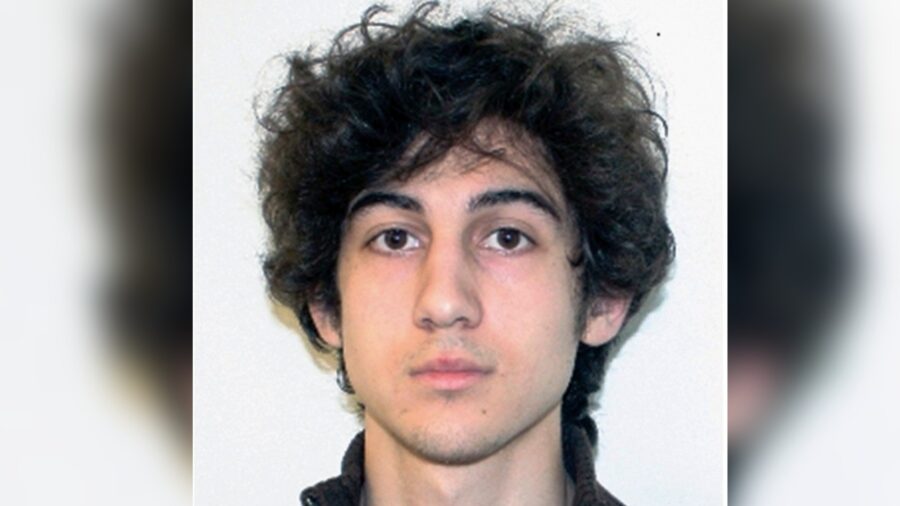On Friday morning, the Supreme Court reinstated the federal death sentence of Dzhokhar Tsarnaev, a terrorist who was convicted of bombing the 2013 Boston Marathon, in a 6–3 decision, with all three liberal justices dissenting from the ruling.
Tsarnaev, 28, is the lone surviving perpetrator of the 2013 attack that has been deemed one of the worst acts of terrorism on U.S. soil since Sept. 11, 2001. Three people were killed and 260 were injured.
Working with his older brother, Tamerlan, who later died after a gunfight with police, Tsarnaev placed a homemade pressure-cooker shrapnel bomb filled with BBs and nails near the crowded finish line area of the Boston Marathon. The bombs placed by the brothers caused devastating injuries to the crowd of spectators.
Despite President Joe Biden’s promise on the campaign trail in 2020 to abolish capital punishment, the government asked the justices to overturn a July 31, 2020, ruling by the U.S. Court of Appeals for the 1st Circuit that vacated the federal death sentence pronounced against Tsarnaev.
A U.S. district court had imposed capital sentences for six counts and sentences of life imprisonment for multiple additional counts. After finding the lower court hadn’t properly assessed potential jury bias, the 1st Circuit affirmed 27 of Tsarnaev’s convictions, reversed three convictions, vacated his capital sentences, and remanded the case for a new penalty proceeding.
The 1st Circuit was wrong, Justice Clarence Thomas wrote in the Supreme Court’s March 4 decision (pdf).
“Dzhokhar Tsarnaev committed heinous crimes,” Thomas wrote.
“The Sixth Amendment nonetheless guaranteed him a fair trial before an impartial jury. He received one.”
At the Supreme Court’s oral arguments on Oct. 13, 2021, Tsarnaev’s guilt was not an issue.
The hearing centered largely around alleged juror bias and evidence that Tamerlan was involved in a jihad-related triple murder two years before the marathon bombing. The evidence was excluded from Tsarnaev’s original trial in federal court in Massachusetts. Tsarnaev’s lawyer argued that the brother influenced and indoctrinated him into supporting a jihad against the United States and that this factor was given short shrift during the sentencing phase.
Thomas rejected claims that the jury-selection process was unfair.
The U.S. district court called upon a jury pool of 1,373 prospective jurors and used the 100-question juror form to cull that down to 256, wrote Thomas.
“The questionnaire asked prospective jurors what media sources they followed, how much they consumed, whether they had ever commented on the bombings in letters, calls, or online posts, and, most pointedly, whether any of that information had caused the prospective juror to form an opinion about Dzhokhar’s guilt or punishment,” the justice wrote.
“The court then subjected those 256 prospective jurors to three weeks of individualized voir dire in which the court and both parties had the opportunity to ask additional questions and probe for bias. Dzhokhar’s attorneys asked several prospective jurors what they had heard, read, or seen about the case in the media.”
The trial court also provided clear, emphatic instructions to jurors on their sworn duty to decide the issues based only on evidence adduced in open court, he wrote.
The trial court’s “jury selection process was both eminently reasonable and wholly consistent with this court’s precedents,” Thomas wrote, adding that the 1st Circuit “erred in holding otherwise.”
Justice Stephen Breyer wrote a dissenting opinion that was joined by Justices Elena Kagan and Sonia Sotomayor.
Breyer noted that during the sentencing phase of his murder trial, Tsarnaev “argued that he should not receive the death penalty primarily on the ground that his older brother Tamerlan took the leading role and induced Dzhokhar’s participation in the bombings.”
“Dzhokhar argued that Tamerlan was a highly violent man, that Tamerlan radicalized him, and that Dzhokhar participated in the bombings because of Tamerlan’s violent influence and leadership,” the justice wrote.
“In support of this argument, Dzhokhar sought to introduce evidence that Tamerlan previously committed three brutal, ideologically inspired murders in Waltham, Massachusetts. The District Court prohibited Dzhokhar from introducing this evidence,” and was wrong to do so, Breyer wrote.
This is a developing story. It will be updated.
From The Epoch Times


